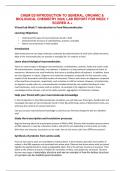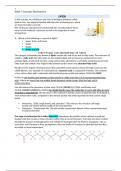Chem120 week 7 Study guides, Class notes & Summaries
Looking for the best study guides, study notes and summaries about Chem120 week 7? On this page you'll find 117 study documents about Chem120 week 7.
Page 2 out of 117 results
Sort by
CHEM120 INTRODUCTION TO GENERAL, ORGANIC & BIOLOGICAL CHEMISTRY 2024| LAB REPORT FOR WEEK 1- 7 SCORED A
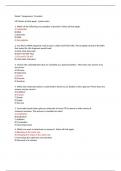
-
CHEM 120 Week 7 Assignment; Biochemistry Part 2 and Flow of Genetic Information (15 Points)
- Other • 3 pages • 2023
- Available in package deal
-
- $20.99
- + learn more
MC/Select all that apply: 1 point each) 1. Which of the following are examples of proteins? Select all that apply. A) Antibodies B) DNA C) Enzymes D) RNA E) Hemoglobin 2. You find a mRNA fragment reads in part as AAU-UUA-GAU-UAA. The template strand of the DNA that coded for this fragment would read: A) AAU-UUA-GAU-UAA B) AAT-TTA-GAT-TAA C) TTA-AAT-CTA-ATT D) UUA-AAU-CUA-AUU 3. Choose the carbohydrates that are classified as a polysaccharides. More than one answer may be correc...
CHEM 120 Week 7 Concepts; Biochemistry
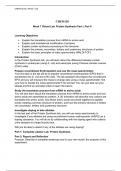
-
CHEM 120 Week 7 Virtual Lab; Protein Synthesis Part I, Part II
- Other • 3 pages • 2023
- Available in package deal
-
- $20.99
- + learn more
Learning Objectives • Explain the translation process from mRNA to amino acid • Explain post-translational modification of proteins • Explain protein synthesis processing in the ribosome • Explain the primary, secondary, tertiary and quaternary structures of protein • Explain the basic principles of mass spectrometry (MALDI-TOF) Introduction In the Protein Synthesis lab, you will learn about the difference between protein synthesis in prokaryote (using E. coli) and eukaryote (us...
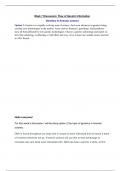
-
CHEM 120 Week 7 Discussion; Flow of Genetic Information - Genetics in Forensic Science
- Other • 2 pages • 2023
- Available in package deal
-
- $18.48
- + learn more
Week 7 Discussion: Flow of Genetic Information Genetics in forensic science Option 2: Genetics is a rapidly evolving area of science. Each year advances in genetics bring exciting new technologies to the market. Areas such as forensics, genealogy, and healthcare have all been affected by new genetic technologies. Choose a genetic technology and report on how this technology is affecting or will affect our lives. Give at least one outside source and cite in APA format.
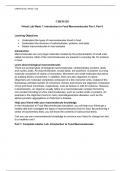
-
CHEM 120 Week 7 Virtual Lab; Introduction to Food Macromolecules Part I, Part II
- Other • 3 pages • 2023
- Available in package deal
-
- $20.99
- + learn more
Learning Objectives • Understand the types of macromolecules found in food • Understand the structure of carbohydrates, proteins, and lipids • Detect macromolecules in food samples Introduction Macromolecules are very large molecules created by the polymerization of small units called monomers. Most of the macromolecules are present in everyday life, for instance in food.

-
CHEM 120 Week 8 Final Exam 2023(100% CORRECT SOLUTIONS) | Already GRADED A.
- Exam (elaborations) • 22 pages • 2021
-
Available in package deal
-
- $12.49
- 10x sold
- + learn more
6. (TCO 6) A gas at a temperature of 95 degrees C occupies a volume of 165 mL. Assuming constant pressure, determine the volume at 25 degrees C. Show your work. (Points : 5) Using Charles’ Law, ( V1/T1) = (V2/T2). First, convert temperature to KELVIN (T1 = t1 +273) Thus, T1 = 95 + 273 = 368. We have V1 (165 mL) & T2 = (25 + 273) = 298. V2 = (V1*T2)/T1 = (165 mL*298)/368 = 133.6 mL. 0 7 Short 16 7. (TCO 6) A sample of helium gas occupies 1021 mL at 719 mmHg. For a gas sample at constant tempera...
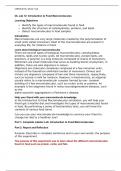
-
CHEM120 OL, Week 7 Lab Introduction to Food Macromolecules
- Other • 3 pages • 2024
-
- $18.49
- + learn more
OL Lab 12: Introduction to Food Macromolecules Learning Objectives Identify the types of macromolecules found in food Identify the structure of carbohydrates, proteins, and lipids Detect macromolecules in food samples Introduction Macromolecules are very large molecules created by the polymerization of small units called monomers. Most of the macromolecules are present in everyday life, for instance in food. Learn about biological macromolecules There are several types of b...
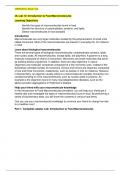
-
Exploring Food Macromolecules: A Week 7 Lab Experience in CHEM120 OL
- Other • 4 pages • 2024
-
- $7.99
- + learn more
Details about a week 7 lab experiment in chem120 ol, focusing on the identification of macromolecules in food. Students will learn about the types of macromolecules (carbohydrates, proteins, and lipids), their structures, and how to detect them in food samples. The lab includes completing the simulation, recording observations, answering questions, and writing a reflection.
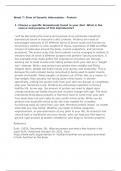
-
CHEM 120 Week 7 Discussion; Flow of Genetic Information - Protein
- Other • 1 pages • 2023
- Available in package deal
-
- $18.48
- + learn more
1. Choose a specific biomolecule found in your diet. What is the source and purpose of this biomolecule?

That summary you just bought made someone very happy. Also get paid weekly? Sell your study resources on Stuvia! Discover all about earning on Stuvia

